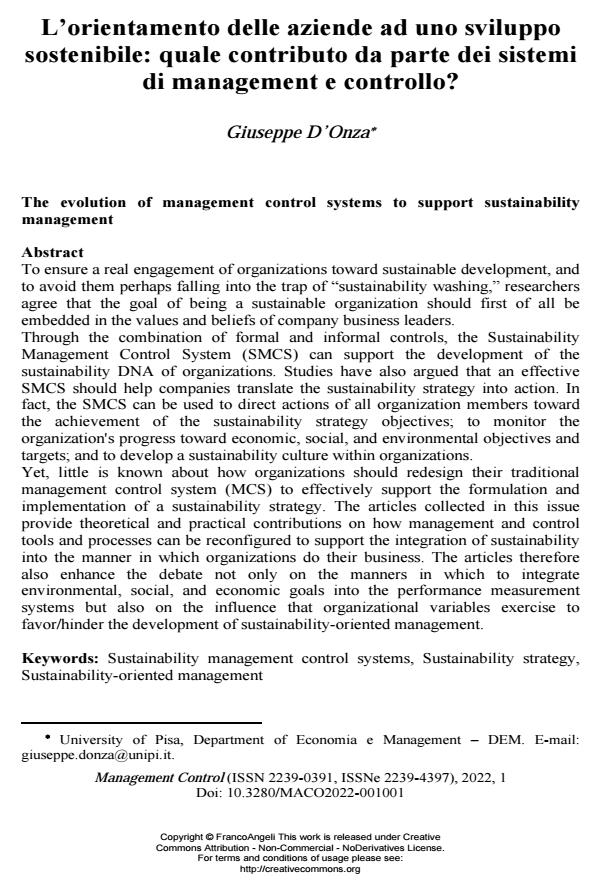L’orientamento delle aziende ad uno sviluppo sostenibile: quale contributo da parte dei sistemi di management e controllo?
Titolo Rivista MANAGEMENT CONTROL
Autori/Curatori Giuseppe D’Onza
Anno di pubblicazione 2022 Fascicolo 2022/1 Lingua Italiano
Numero pagine 11 P. 5-15 Dimensione file 186 KB
DOI 10.3280/MACO2022-001001
Il DOI è il codice a barre della proprietà intellettuale: per saperne di più
clicca qui

FrancoAngeli è membro della Publishers International Linking Association, Inc (PILA)associazione indipendente e non profit per facilitare (attraverso i servizi tecnologici implementati da CrossRef.org) l’accesso degli studiosi ai contenuti digitali nelle pubblicazioni professionali e scientifiche
;
Keywords:Sustainability management control systems, Sustainability strategy, Sustainability-oriented management
- Bertini U. (1990), Scritti di politica aziendale, Torino, Giappichelli editore.
- Brundtland G.H. (1987), Our Common Future, Oxford, Paperbacks.
- Castellano N., Felden C. (2021), Management Control Systems for Sustainability and Sustainability of Management Control Systems, Management Control, 2, pp. 5-10. DOI: 10.3280/MACO2021-002001
- Cinquini L., Passetti E., Tenucci A. (2016), La sostenibilità ambientale in azienda: quale relazione tra disclosure volontaria e gestione interna? Management Control, Suppl. 2, pp. 15-32. DOI: 10.3280/MACO2016-002002
- Coda V. (2020), Lo scopo dell’impresa, Impresa progetto, pp. 1-26
- Corsi K., Arru B. (2020), Role and implementation of sustainability management control tools: critical aspects in the Italian context, Accounting, Auditing & Accountability Journal.
- Dodd Jr E.M. (1931), For whom are corporate managers trustees, Harvard Literature Review, 45, 1145.
- D’Onza G. (2013). La prevenzione delle frodi aziendali: alle radici della responsabilità sociale, Milano, FrancoAngeli.
- Fiorentino R., Garzella S., Lamboglia R., Mancini D. (2016), Strategie di sostenibilità: dalle motivazioni ai sistemi di misurazione della performance, Management Control, Suppl. 2, pp. 115-142. DOI: 10.3280/MACO2016-002006
- Marchi L. (2019), La creazione e la misurazione del valore dalla prospettiva finanziaria alla prospettiva economico-sociale, Lectio Magistralis tenuta presso l’Università di Pisa
- Matacena A. (2021), Responsabile e valori delle imprese profit, in Scritti in onore di Luciano Marchi, Creazione di valore nella prospettiva economico-aziendale, Volume I, Torino, Giappichelli editore.
- Mio C. (2006), Integrated reporting. A New Accounting Disclosure, London, Macmillan.
- Porter M.E., Kramer M.R. (2019), Creating shared value. In Managing sustainable business (pp. 323-346). Dordrecht, Springer.
- Riccaboni A., Leone E.L. (2010), Implementing strategies through management control systems: the case of sustainability, International Journal of Productivity and Performance Management.
- Rusconi G. (2019), Ethical Firm System and Stakeholder Management Theories: A Possible Convergence, European Management Review, 19, pp. 147-166.
- Il contributo di Management Control alla ricerca su tecnologie digitali e sostenibilità Daniela Mancini, Domenica Lavorato, Palmira Piedepalumbo, in MANAGEMENT CONTROL 2/2023 pp.5
DOI: 10.3280/MACO2023-002001 - "Radicare" la sostenibilità nella strategia attraverso i sistemi di management control: un caso di studio relativo ad una Pmi Armando Della Porta, Francesco De Luca, Chiara Aufiero, in MANAGEMENT CONTROL 2/2023 pp.43
DOI: 10.3280/MACO2023-002003 - Shedding light on the preconditions for circular economy: Evidence from SMEs in the agri-food sector Francesco Avallone, Costanza Di Fabio, Shekerta Aliu, Elisa Roncagliolo, in MANAGEMENT CONTROL 3/2024 pp.141
DOI: 10.3280/MACO2023-003007 - Sustainability reporting: How consistency and interdependence in financial and managerial accounting enhance eco‐controls Ashish Varma, Daniela Mancini, Shreya Kaushik, in Journal of Public Affairs e2910/2024
DOI: 10.1002/pa.2910 - Il contributo dei sistemi di RM e PM alla sostenibilità integrata: il caso B&C Speakers Lorenzo Leto, Diletta Vito, in MANAGEMENT CONTROL 3/2024 pp.113
DOI: 10.3280/MACO2023-003006 - Integrare gli SDG nella valutazione degli investimenti aziendali: risultati da un approccio interventista Giacomo Pigatto, Miriam Corrado, Lino Cinquini, Maria Serena Chiucchi, Andrea Tenucci, in MANAGEMENT CONTROL 2/2023 pp.69
DOI: 10.3280/MACO2023-002004 - La prospettiva della performatività e gli strumenti di misurazione e gestione della performance Lino Cinquini, Silvana Revellino, Maria Serena Chiucchi, in MANAGEMENT CONTROL 3/2024 pp.5
DOI: 10.3280/MACO2023-003001
Giuseppe D’Onza, L’orientamento delle aziende ad uno sviluppo sostenibile: quale contributo da parte dei sistemi di management e controllo? in "MANAGEMENT CONTROL" 1/2022, pp 5-15, DOI: 10.3280/MACO2022-001001